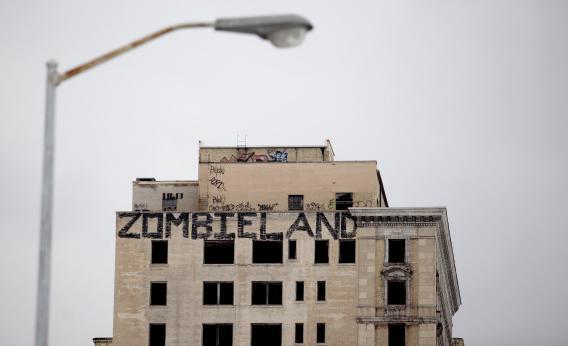Chris Lewis crystallizes the meme proffered by opponents of the Michigan Emergency Manager Law. Up to now, opponents of the law that allows a state-appointed bureaucrat to rule a city until certain goals are met had been criticized as “un-democratic.” That it is, of course, though the residents of these cities had the chance to vote for their governor and state legislators. But the new meme, as a subhed-author puts it for Lewis, is that the disproportionate black populations of this city should disturb us. Now that Detroit’s fallen under the yoke, half the state’s black population is living under EMs. Taking away the Detroit resident’s ability to vote for mayor? That’s the “new Jim Crow.”
Lewis himself is a little more circumspect, quoting the people suing or supporting the lawsuit to overturn the law.
“The overall health of a community depends on people’s sense of having a stake in it,” said David Bullock, pastor of two Detroit area churches and founder of the civic group Change Agent Consortium. “Emergency management just works against long-term stability and health for communities, because the people on the ground feel like they don’t have any voice or value.”
One problem with this: Confidence in their elected officials was collapsing before the EM came to town. Detroit’s previous elected mayor, Kwame Kilpatrick, won two terms on low turnout, then went to jail on a total of 26 felony counts. The city council president elevated by his resignation, Monica Conyers, went to jail, too. And the problem runs deeper than that, with a total lack of faith in city services. (Watch some of Charlie LeDuff’s dispatches from the city about the length of time it takes to get cops to show up after a 911 call.) By the way, the emergency manager hired to preside over this, Kevyn Orr, is black. Does that matter? It complicates the “Jim Crow” huffing a little, doesn’t it?
Perhaps the D.C. reporter’s perspective on this is skewed. We’re able to choose some of our elected officials. We can vote for president and vice president; we can vote for D.C. council, mayor, ANC, and and school board. But we can’t vote for Congress, and Congress* retains a vast degree of control and oversight over the city. This horrifying un-democratic state of affairs has been in place during a time of economic growth, lower crime, and more movement into the city. The EMs have worked in other Michigan cities hollowed out by closed factories. Whether they work is more important than whether voters, for a few years, have the opportunity to approve of a government they don’t trust.
*This originally read “contains” instead of Congress. Why? An excellent and unanswerable question.
